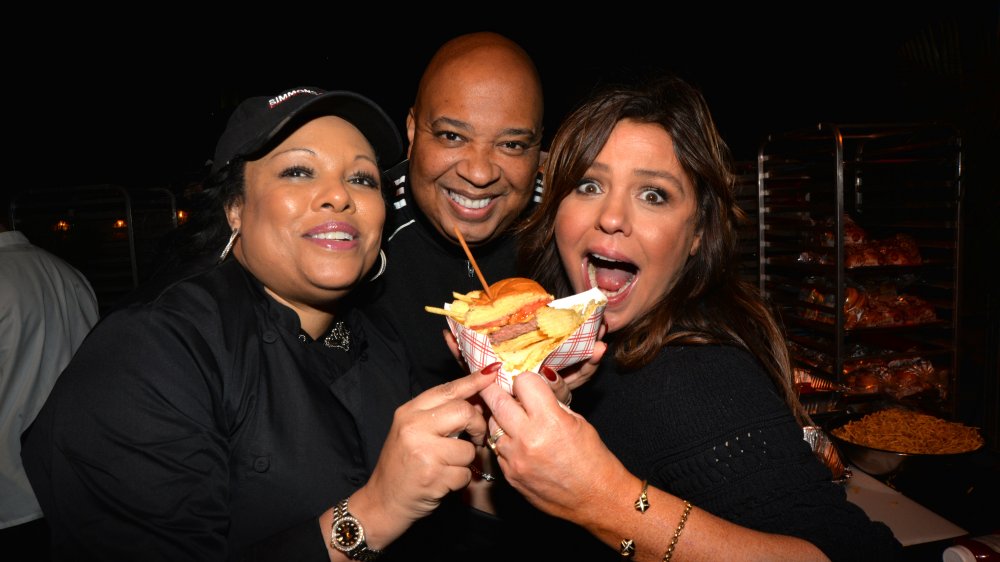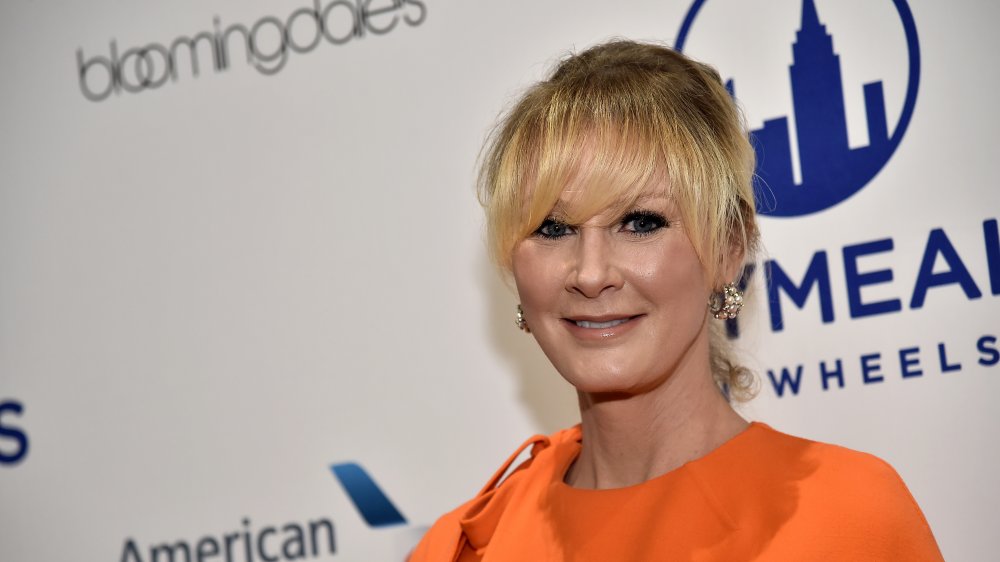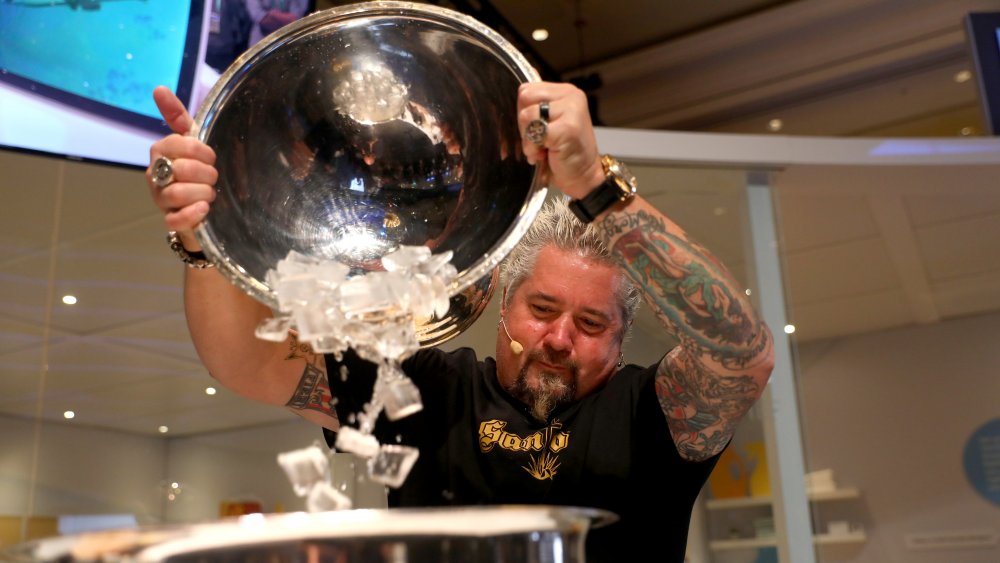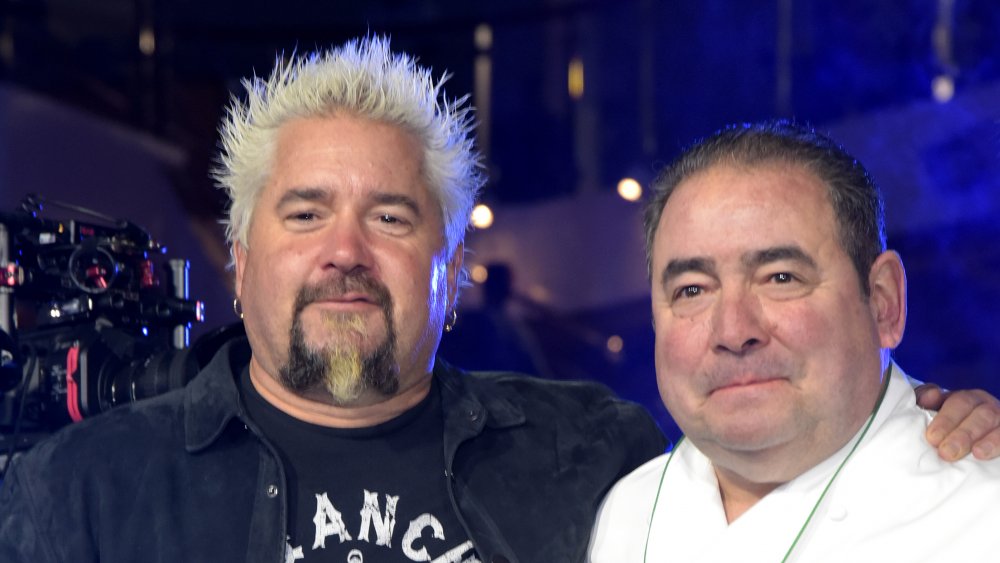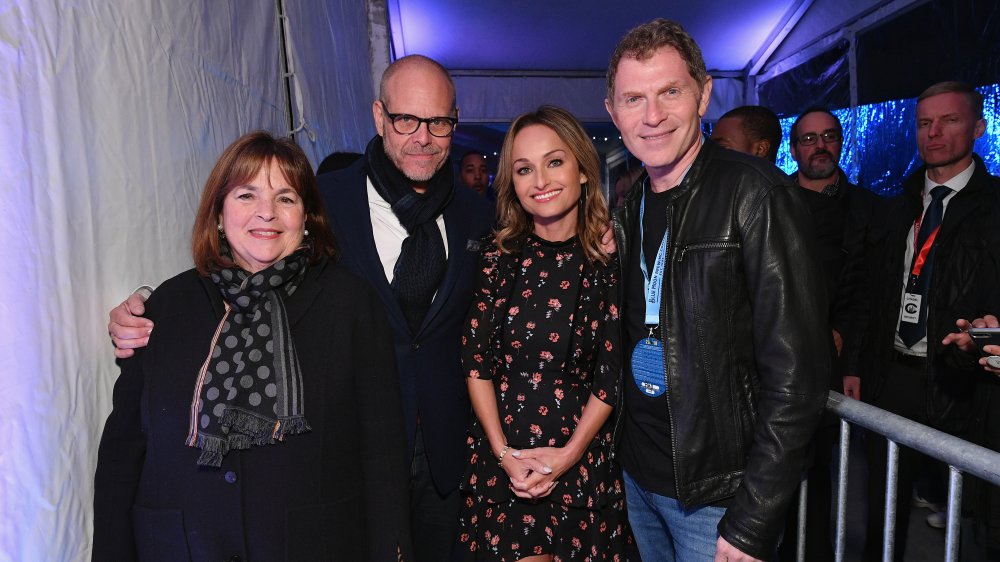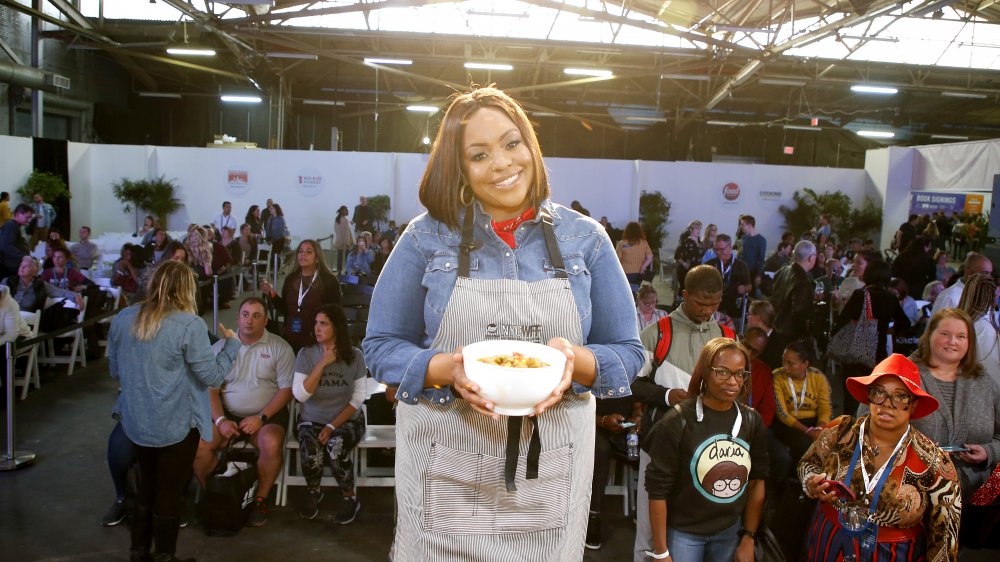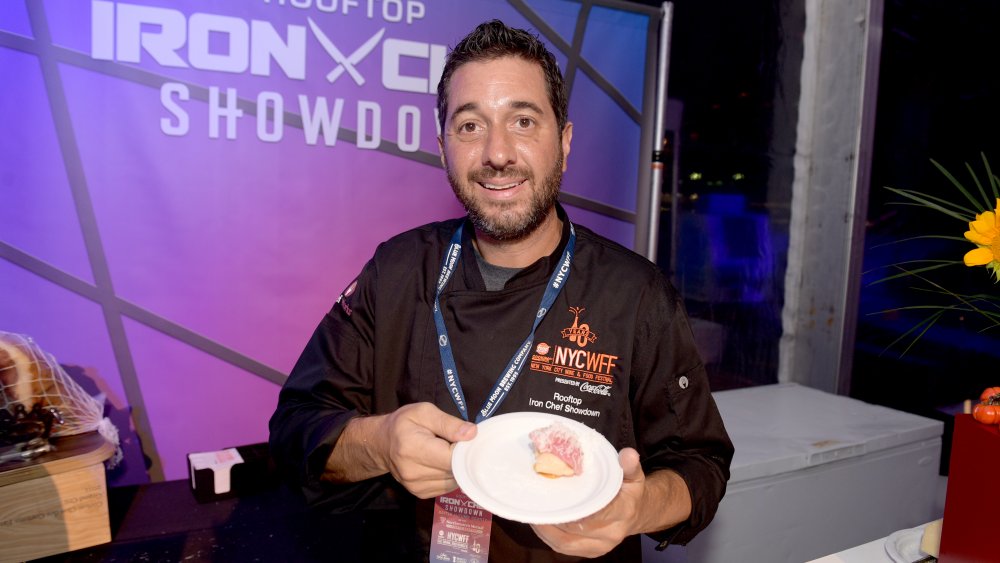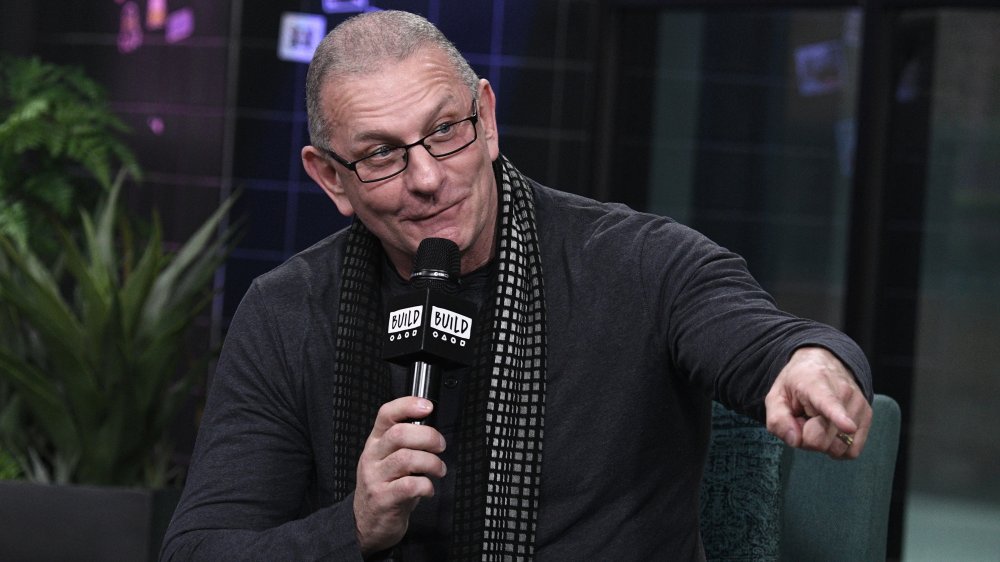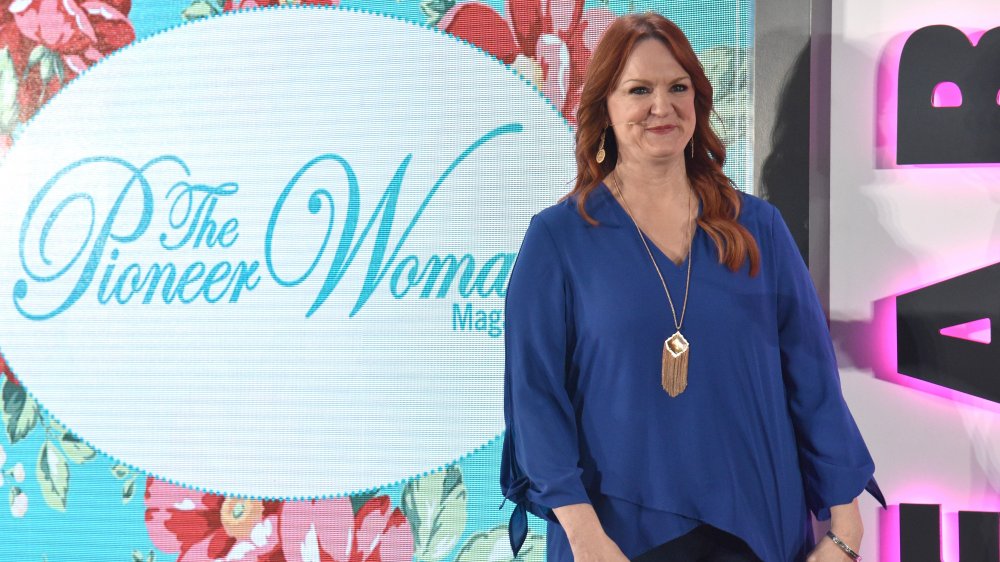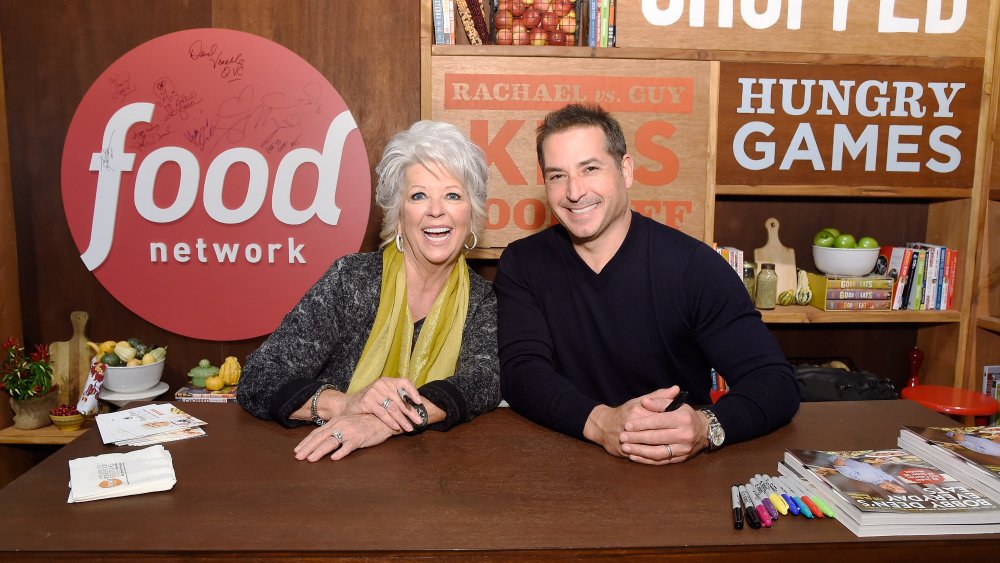The Food Network Has Made Some Pretty Bad Decisions
Not many could have predicted a low-budget network starting in the early '90s would emerge to change television while creating an entire cult of celebrity around chefs in the process. Food Network perfected culinary entertainment and in large part produced the era of the celebrity chef as we now know it. Watching cooking shows presents massive appeal to both cooking aficionados and people who use their oven as storage. Despite its popularity, the Food Network has taken more than a few stumbles along the way. Viewers' tastes have shifted, chefs have created controversy on- and off-camera, and more than a few claims of cultural appropriation have left the station with egg on its face.
Over time, original programming simply featuring chefs such as Emeril Lagasse in the studio kitchen evolved into the mega-hit cooking competitions Iron Chef America and Chopped, among their many iterations. This shift in programming is one reason loyalists claim the Food Network has made some poor decisions over the years. Did you know Emeril didn't leave willingly? Maybe you noticed the network's shift to comfort food over healthy cuisine? Between Paula Deen scandals and its lackluster representation of any culture outside the Midwest (and perhaps Italy), the Food Network has seen its share of criticism. However, there's so much more going on behind the scenes with American TV's cooking giant than you might think.
Allowing an abomination of Kwanzaa Cake to cooked on by a white Food Network chef without a clue
This iconic segment from Sandra Lee's cooking show Semi-Homemade Cooking really takes the cake when it comes to poor taste and even worse judgment. Lee gained popularity on her long-running Food Network show for her trademark Semi-Homemade philosophy, combining fresh ingredients with pre-made and store-bought items. Lee's infamous Kwanzaa cake is made from a disturbing combination of store-bought cake, frosting, canned pie filling, and corn nuts.
Not only does the cake sound unappetizing, but the recipe is also made up. To make matters worse, the white host and recipe writer are seemingly unfamiliar with actual Kwanzaa traditions. Adding further tension, Salon reported the food stylist and recipe writer Denise Vivaldo disavowed the cake in an article, which has since been removed from the Huffington Post. Vivaldo claimed to have been pressured to produce the recipe for Lee's show out of financial need.
Unsurprisingly, the segment received widespread criticism. AV Club aptly described it as "a pile of ridiculousness slathered in despair and sprinkled with nonsense nuggets." In this case, Lee's offensive cake has no cultural relevance and doesn't seem like a recipe that would be welcome at any holiday table.
Overselling the appeal of Guy Fieri as a host on the Food Network
The Food Network is known to capitalize on a good thing. Some might argue there's a bit too much of a good thing, though, when it comes to Guy Fieri. The TV personality premiered his first show on Food Network, Guy's Big Bite, in 2006, but he's best recognized for hosting Diners, Drive-Ins and Dives — referred to as "Triple D" by the excited host who's prone to shouting.
Salon writer Farsh Askari laments how on certain days, the Guy Fieri show runs repeatedly from afternoon to evening, a typical scheduling strategy for the network where blocks of the same show are repeated. Over the years, Fieri had starred on at least six other Food Network shows. In addition to Diners, Drive-Ins and Dives and Guy's Big Bite, he can be found on Guy's Grocery Games, Rachel vs. Guy: Celebrity Cook-Off, Rachael vs. Guy: Kids Cook-Off, and Food Network Star.
Despite Food Network's abundance of Guy Fieri, the channel kept quiet when a former producer alleged that Fieri made homophobic comments about a restaurant owner. According to the New York Post, David Page, a producer of Diners, Drive-Ins and Dives, had a falling out with Fieri, and he was fired as a result. Page sued Food Network for breach of contract, but the network countersued and said Page mistreated the staff in emails. The two settled out of court, and Fieri's show survived to see another diner with a new producer.
Food Network canceling chefs and shifting to unhealthy cooking and competition shows
One complaint about The Food Network's programming is that it's shifted to focus more on pop culture and guilty-pleasure recipes over the years. The network has always featured personalities, but culinary tastes went beyond the diner in earlier days. In the Food Network's infancy, Buzzfeed remembers when trained chefs such as Sara Moulton taught viewers the difference between leafy greens like kale and chard. One daily program called Food News and Views actually debated federal nutrition guidelines.
In the early 2000s, the network realized most people watched the network for entertainment rather than instruction. Shows pivoted to showing fewer chefs, additional personalities, and more desserts. Celebrity chef Anthony Bourdain mostly observed and rarely cooked on his travel cooking show A Cook's Tour. After 10 years on the Food Network, the executives canceled Emeril Live, led by one of the network's earliest cooking celebrities Emeril Lagasse. The show debuted in 1997 with a live band, studio audience, and Emeril's catchphrase "Bam!" It featured many guests, including original cooking show icon, chef Julia Child.
The formerly chef-driven channel is now packed with comfort-food shows and competition heavyweights. The Food Network might be criticized for making competitions instead of chefs the main focus on TV, but the shift eventually worked in terms of ratings.
Limited diversity on the Food Network and streaming services
As recently as 2020, the network has been criticized for its lack of diversity on screen. Some note that women are more often Chopped in its cooking competitions. Wired found on-camera talent to be vastly white, with very few people of color hosting on the network's cooking app. Since then, Wired reported that the network's app made changes to feature a more diverse cast since the app first launched.
Regular cable programming for the Food Network also remains largely homogeneous. Blavity examined how the network allows a very limited number of people of color to have their own cooking shows. People of color are often relegated to hosts and competitors on reality shows like Iron Chef and Food Network Star. Up until 2017, there were only a few cooking shows featuring people of color, including Ming Tsai, Sunny Anderson, the Neelys, Aaron McCargo, Jr., Aarti Sequeira, and Marcela Valladolid. The network axed Aarti's Party after three seasons, and two chefs left to continue on their own shows. By 2019, though, the station expanded its roster with Kardea Brown's coastal Southern dishes on Delicious Miss Brown and Molly Yeh's Girl Meets Farm creations inspired by her Jewish and Chinese heritage.
The network's decision to not feature a balance of cultures aside from an abundance of Italian and white Southern chefs is a miss. Diversity on-screen needs to be more than a trend, and hopefully, it will continue on all the network's platforms.
People of color on the Food Network are pigeonholed into comfort food segments
Not only are the shows featuring people of color limited, the hosts often aren't chefs, and the style of cooking is shown as "natural" or domestic "soul food" focusing on comfort rather than technique. The book African Americans on Television explains this setup isn't necessarily an issue until we examine the history of people of color, especially Black people, as domestic labor. It's problematic to have people of color only perceived as making approachable "home cooking" versus having the opportunity to be presented as experts like other chefs on the network. Then, consider the fact that these "soul food" shows show chefs of color are cooking for what often appears to be a largely white, middle-class Food Network audience, and the situation gets even murkier.
Cooking shows are often very Eurocentric, elevating Western European foods such as Italian cuisine with fan favorites like Giada De Laurentiis. Moves to remedy the disparity on screen include the addition of Molly Yeh's mashup of Chinese and Jewish dishes in 2018 and Kardea Brown's Southern coastal cuisine in 2019. Out of the numerous cooking shows on the network, diversity in both cuisine and on-screen talent might be the answer to reaching a more diverse audience that's hungry for more representation.
Focusing on a male audience resulted in a ratings drop for the Food Network
Reality shows causing a drop in ratings might sound like a strange statement today. Eater speculated that the Food Network's push to expand its core audience to more young male viewers might have turned out to be the wrong move in 2010. The culinary-focused outlet reported that including more reality TV in primetime programming resulted in derivatives of some of its (or other networks') hits. The network ultimately canceled the show Chefs vs. City, a food-based Amazing Race copycat, after just two seasons. The unintended consequence of programming changes might have added to a perfect storm when combined with lackluster new shows.
Huffington Post reported a loss to the network's key demographic, women ages 18 to 49 and 25 to 54, who gravitated to other channels in the early 2010s. Viewers moved to other networks where reality and cooking shows such as Cake Boss and Top Chef reigned supreme. It should also be pointed out how the network's parent company, Scripps, launched the Cooking Channel and Travel Channel that same year. The added network competition might have been the icing on the cake for the Food Network's pivot and further damaged its ratings at the time.
Re-hiring chef Robert Irvine on the Food Network after finding out he lied on his resume
Chef Robert Irvine rose to acclaim on Food Network thanks to his winning personality as host of Dinner: Impossible and years of experience in the culinary world. In 2008, Irvine gained exposure of a different kind after it was leaked that his resume had been significantly fabricated.
The BBC reported that the inaccuracies in his resume included a British knighthood, ownership of a castle in Scotland, friendship with Prince Charles, and the chance to cook for four United States presidents. The Food Network dismissed Irvine from Dinner: Impossible and replaced him with Michael Symon. Audiences didn't seem to agree that Symon was up to the job, however, and Irvine returned to host the show once again despite the publicity debacle.
While the Food Network may not have cared much about credentials, the network's writers might not have been so easy to forgive. Irvine's new missions on Dinner: Impossible set him up for failure. He reportedly showed up to a set without equipment or appliances, so it was almost impossible to meet the demands of each show. Sometimes lying to your co-workers really doesn't work out so well.
The Food Network kept a controversial episode of 'The Pioneer Woman'
The Food Network is notorious for its lack of diversity and preference for Eurocentric cuisine. Chef Ree Drummond took that reputation to new lows. As host of the long-running The Pioneer Woman cooking show, Drummond prepared Asian hot wings for her family as a surprise. Anyone with taste buds would have agreed the dish looked incredible. Drummond then presented her family with the Asian-style wings as a game-day snack.
The on-camera group of grown men and children appeared disgusted by the piping-hot food pulled straight from the oven, asking if they were even "real wings." Drummond laughed at them and then revealed the very unfunny joke. She said, "I'm just kidding guys, I wouldn't do that to you," and then swapped the Asian hot wings out for regular American Buffalo wings to complete the bit.
The clip made its rounds on social media for perpetuating distrust of Asian culture. The Huffington Post reported how critics and viewers attacked the Food Network too, pointing out that the channel needs better Asian representation. Many felt the network need to own up to Drummond deciding to make a joke about the lesser "exotic" cuisine, which only exacerbated the undercurrent of xenophobia and racism too many already felt from the station. Sites called for the Food Network to stop airing the episode. The network's worst move of all? It took five years to get the segment pulled after it first aired.
The 'Next Food Network Star' chef JAG lied about military service
Turns out the Food Network has a history of not fact-checking. Joshua Adam Garcia, aka Chef JAG, became a fan and judges' favorite on Food Network Star thanks to his unlikely background story. JAG claimed to have graduated from the New York Restaurant School and joined the Marines where he served in a war zone. There he reached the rank of corporal. His resume turned out to be so unlikely, it was a fraud. The show revealed the betrayal on network television and shocked the audience when the finalist was asked to step down before the final vote.
The real background of this disgraced chef is much less decorated. JAG never graduated from the New York Restaurant School and never served in a war zone rising to the rank of corporal. In reality, he'd been demoted due to a Marines hazing scandal, and his military career was cut short. Food Network forced JAG to withdraw from the competition show, but his memory lives on as an iconic moment of television.
The Food Network's Bobby Deen appearing in brownface with his mom
Southern cooking personality Paula Deen is not one to shy away from controversy. What's a bit more unusual is for the scandals to directly involve her son, Bobby Deen. Paula's team posted on Twitter a photo of the mother-and-son team dressed as Lucy and Ricky from I Love Lucy, complete with Bobby sporting offensive brownface makeup. Obviously, it wasn't a good look, and backlash quickly ensued. To make matters worse, Paula had apologized only two years earlier for using racial slurs in her 2013 lawsuit from a former employee.
The photo, which tagged Bobby on Twitter, was eventually deleted, and Paula Deen announced the social media representative responsible was fired for the incident. That doesn't explain, however, how anyone thought the brownface makeup was a good idea in the first place. And while not necessarily offensive, it's also a bit weird for a mother and son to dress up as a married couple.
Regardless of the social media criticism, the incident didn't harm Bobby's standing with the network. Today, Bobby's show, Not My Mama's Meals (a lighter approach to cooking than his mother's signature style) airs on the Food Network's sister network, the Cooking Channel. The younger Deen has also been seen on the Food Network hosting several seasons of Holiday Baking Championship and Spring Baking Championship.
The Food Network's Jamie Oliver's cultural on-air appropriation
UK transplant Jamie Oliver once hosted the fully clothed culinary show, The Naked Chef, in the early days of the Food Network. His relaxed and laid-back approach to food made him a household name after the show first aired in 1999. The popularity eventually led to his own line of cooking products including a poorly named rice. Oliver released a product called "punchy jerk rice," supposedly flavored and inspired by traditional Jamaican cooking. You might be asking, what's jerk rice? Well, that Food Network scandal is what made people pretty upset with him because jerk rice isn't a thing.
A jerk is a spice rub made of allspice and scotch bonnet peppers. Traditionally, the rub is used for chicken or pork that is then barbecued. Jamaican-born Levi Roots, a chef who actually taught Oliver how to cook jerk style, called him out for the appropriation from Jamaica that "needs to stop."
Aside from the recipe itself, the real outrage about the rice centered around the tendency to borrow from other ethnic groups without regard for knowledge of the culture and the careful handling of those traditions. In other words, as a culinary figure, Oliver should've known better. He attempted to brush off the criticism, saying he only meant to nod to the flavor's inspiration. Oliver might think twice, however, before borrowing cultural traditions for his next sales pitch.
